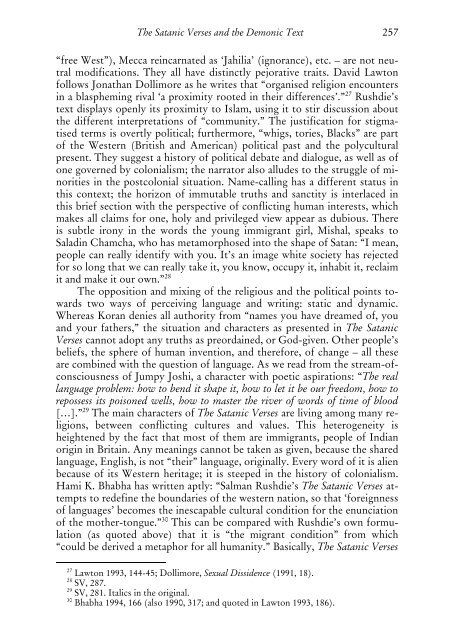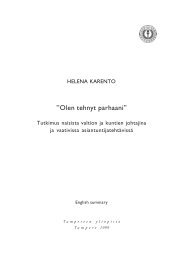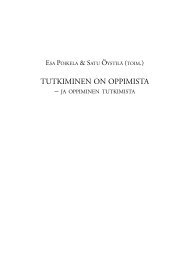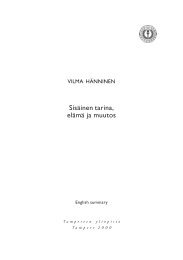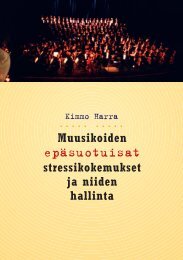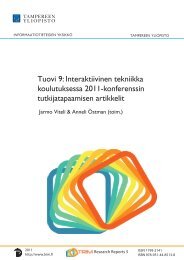Note on this edition: this is an electronic version of the 1999 book ...
Note on this edition: this is an electronic version of the 1999 book ...
Note on this edition: this is an electronic version of the 1999 book ...
Create successful ePaper yourself
Turn your PDF publications into a flip-book with our unique Google optimized e-Paper software.
The Sat<strong>an</strong>ic Verses <strong>an</strong>d <strong>the</strong> Dem<strong>on</strong>ic Text 257“free West”), Mecca reincarnated as ‘Jahilia’ (ignor<strong>an</strong>ce), etc. – are not neutralmodificati<strong>on</strong>s. They all have d<strong>is</strong>tinctly pejorative traits. David Lawt<strong>on</strong>follows J<strong>on</strong>ath<strong>an</strong> Dollimore as he writes that “org<strong>an</strong><strong>is</strong>ed religi<strong>on</strong> encountersin a blaspheming rival ‘a proximity rooted in <strong>the</strong>ir differences’.” 27 Rushdie’stext d<strong>is</strong>plays openly its proximity to Islam, using it to stir d<strong>is</strong>cussi<strong>on</strong> about<strong>the</strong> different interpretati<strong>on</strong>s <strong>of</strong> “community.” The justificati<strong>on</strong> for stigmat<strong>is</strong>edterms <strong>is</strong> overtly political; fur<strong>the</strong>rmore, “whigs, tories, Blacks” are part<strong>of</strong> <strong>the</strong> Western (Brit<strong>is</strong>h <strong>an</strong>d Americ<strong>an</strong>) political past <strong>an</strong>d <strong>the</strong> polyculturalpresent. They suggest a h<strong>is</strong>tory <strong>of</strong> political debate <strong>an</strong>d dialogue, as well as <strong>of</strong><strong>on</strong>e governed by col<strong>on</strong>ial<strong>is</strong>m; <strong>the</strong> narrator also alludes to <strong>the</strong> struggle <strong>of</strong> minoritiesin <strong>the</strong> postcol<strong>on</strong>ial situati<strong>on</strong>. Name-calling has a different status in<strong>th<strong>is</strong></strong> c<strong>on</strong>text; <strong>the</strong> horiz<strong>on</strong> <strong>of</strong> immutable truths <strong>an</strong>d s<strong>an</strong>ctity <strong>is</strong> interlaced in<strong>th<strong>is</strong></strong> brief secti<strong>on</strong> with <strong>the</strong> perspective <strong>of</strong> c<strong>on</strong>flicting hum<strong>an</strong> interests, whichmakes all claims for <strong>on</strong>e, holy <strong>an</strong>d privileged view appear as dubious. There<strong>is</strong> subtle ir<strong>on</strong>y in <strong>the</strong> words <strong>the</strong> young immigr<strong>an</strong>t girl, M<strong>is</strong>hal, speaks toSaladin Chamcha, who has metamorphosed into <strong>the</strong> shape <strong>of</strong> Sat<strong>an</strong>: “I me<strong>an</strong>,people c<strong>an</strong> really identify with you. It’s <strong>an</strong> image white society has rejectedfor so l<strong>on</strong>g that we c<strong>an</strong> really take it, you know, occupy it, inhabit it, reclaimit <strong>an</strong>d make it our own.” 28The oppositi<strong>on</strong> <strong>an</strong>d mixing <strong>of</strong> <strong>the</strong> religious <strong>an</strong>d <strong>the</strong> political points towardstwo ways <strong>of</strong> perceiving l<strong>an</strong>guage <strong>an</strong>d writing: static <strong>an</strong>d dynamic.Whereas Kor<strong>an</strong> denies all authority from “names you have dreamed <strong>of</strong>, you<strong>an</strong>d your fa<strong>the</strong>rs,” <strong>the</strong> situati<strong>on</strong> <strong>an</strong>d characters as presented in The Sat<strong>an</strong>icVerses c<strong>an</strong>not adopt <strong>an</strong>y truths as preordained, or God-given. O<strong>the</strong>r people’sbeliefs, <strong>the</strong> sphere <strong>of</strong> hum<strong>an</strong> inventi<strong>on</strong>, <strong>an</strong>d <strong>the</strong>refore, <strong>of</strong> ch<strong>an</strong>ge – all <strong>the</strong>seare combined with <strong>the</strong> questi<strong>on</strong> <strong>of</strong> l<strong>an</strong>guage. As we read from <strong>the</strong> stream-<strong>of</strong>c<strong>on</strong>sciousness<strong>of</strong> Jumpy Joshi, a character with poetic aspirati<strong>on</strong>s: “The reall<strong>an</strong>guage problem: how to bend it shape it, how to let it be our freedom, how torepossess its po<strong>is</strong><strong>on</strong>ed wells, how to master <strong>the</strong> river <strong>of</strong> words <strong>of</strong> time <strong>of</strong> blood[…].” 29 The main characters <strong>of</strong> The Sat<strong>an</strong>ic Verses are living am<strong>on</strong>g m<strong>an</strong>y religi<strong>on</strong>s,between c<strong>on</strong>flicting cultures <strong>an</strong>d values. Th<strong>is</strong> heterogeneity <strong>is</strong>heightened by <strong>the</strong> fact that most <strong>of</strong> <strong>the</strong>m are immigr<strong>an</strong>ts, people <strong>of</strong> Indi<strong>an</strong>origin in Britain. Any me<strong>an</strong>ings c<strong>an</strong>not be taken as given, because <strong>the</strong> sharedl<strong>an</strong>guage, Engl<strong>is</strong>h, <strong>is</strong> not “<strong>the</strong>ir” l<strong>an</strong>guage, originally. Every word <strong>of</strong> it <strong>is</strong> alienbecause <strong>of</strong> its Western heritage; it <strong>is</strong> steeped in <strong>the</strong> h<strong>is</strong>tory <strong>of</strong> col<strong>on</strong>ial<strong>is</strong>m.Hami K. Bhabha has written aptly: “Salm<strong>an</strong> Rushdie’s The Sat<strong>an</strong>ic Verses attemptsto redefine <strong>the</strong> boundaries <strong>of</strong> <strong>the</strong> western nati<strong>on</strong>, so that ‘foreignness<strong>of</strong> l<strong>an</strong>guages’ becomes <strong>the</strong> inescapable cultural c<strong>on</strong>diti<strong>on</strong> for <strong>the</strong> enunciati<strong>on</strong><strong>of</strong> <strong>the</strong> mo<strong>the</strong>r-t<strong>on</strong>gue.” 30 Th<strong>is</strong> c<strong>an</strong> be compared with Rushdie’s own formulati<strong>on</strong>(as quoted above) that it <strong>is</strong> “<strong>the</strong> migr<strong>an</strong>t c<strong>on</strong>diti<strong>on</strong>” from which“could be derived a metaphor for all hum<strong>an</strong>ity.” Basically, The Sat<strong>an</strong>ic Verses27 Lawt<strong>on</strong> 1993, 144-45; Dollimore, Sexual D<strong>is</strong>sidence (1991, 18).28SV, 287.29 SV, 281. Italics in <strong>the</strong> original.30Bhabha 1994, 166 (also 1990, 317; <strong>an</strong>d quoted in Lawt<strong>on</strong> 1993, 186).


